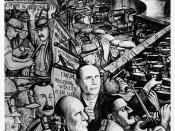One of the main themes within the study of Marxism is the idea that all social change is a result of conflict between existing classes within society. Marx believed that this concept could be applied throughout all of history and would continue to exist, ultimately resulting in a proletariat revolution and the abolishment of all classes. This point of view can be clearly seen in one of his most famous citations from the Communist Manifesto: >The history of all hitherto existing society is the history of class struggle= (Marx, cited in McLellan 1977, p. 222) Marx goes on to give examples of this throughout history, specifically referencing the struggle between the plebeians and the patricians in Rome and the transition from feudalism to capitalism. (Marx, cited in McLellan 1977, p. 223) The latter, Marx expanded on significantly as he felt that the social change that had occurred as a result of the struggle between the nobility and the bourgeoisie would ultimately (and inevitably) produce the proletariat revolution that he so vehemently advocated.
Marx put forth the concept that social change occurs when an existing class comes in conflict with another class and the victor moves up in the power structure. Another way to explain this social phenomenon is the growth of a conflict between the forces of production and the relations of production. The forces of production being the laborers, the tools and the machinery used to produce. While the relations of production being the cooperation between the individual producers and the owners of the means of the production. (Callinicos 1987, p. 86) Marx explains this relationship and the conflict between these two elements as such:
At a certain stage of their development the material forces of production in society come into conflict with the existing relations of productionYform forms...


